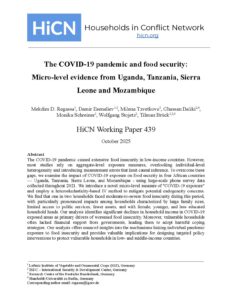The COVID-19 pandemic caused extensive food insecurity in low-income countries. However, most studies rely on aggregate-level exposure measures, overlooking individual-level heterogeneity and introducing measurement errors that limit causal inference. To overcome these gaps, we examine the impact of COVID-19 exposure on food security in four African countries — Uganda, Tanzania, Sierra Leone, and Mozambique – using large-scale phone survey data collected throughout 2021. We introduce a novel micro-level measure of “COVID-19 exposure” and employ a heteroskedasticity-based IV method to mitigate potential endogeneity concerns. We find that one in two households faced moderate-to-severe food insecurity during this period, with particularly pronounced impacts among households characterized by large family sizes, limited access to public services, fewer assets, and with female, younger, and less educated household heads. Our analysis identifies significant declines in household income in COVID-19 exposed areas as primary drivers of worsened food insecurity. Moreover, vulnerable households often lacked financial support from governments, leading them to adopt harmful coping strategies. Our analysis offers nuanced insights into the mechanisms linking individual pandemic exposure to food insecurity and provides valuable implications for designing targeted policy interventions to protect vulnerable households in low- and middle-income countries.
Publication Details
- Year of Publication: 2025








